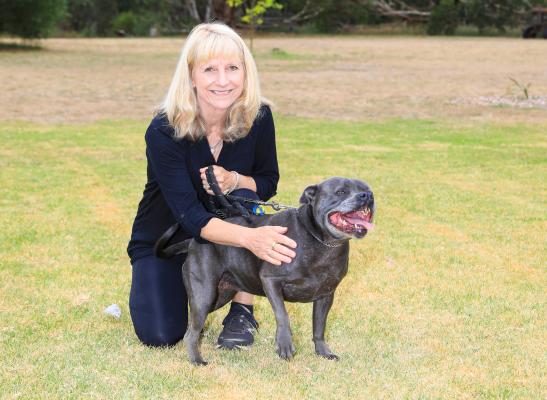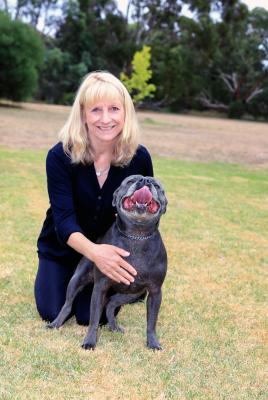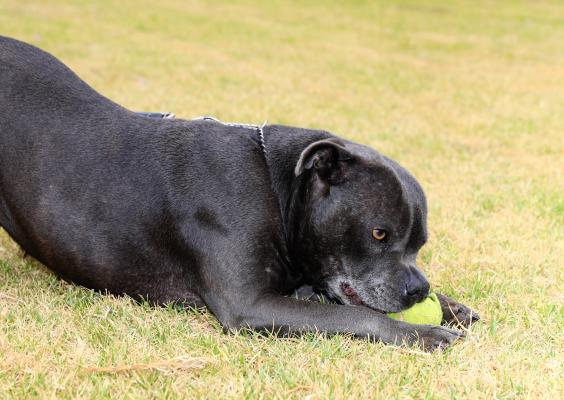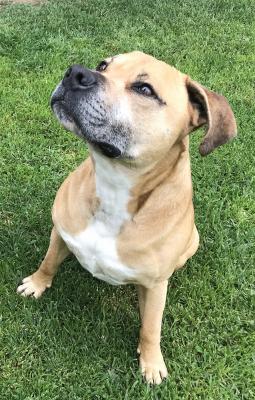With a name like Indy, it’s hard to go past this excitable, tennis ball-loving, six-year-old staffy.
Luke Voogt discovers the story behind Indy and canine companion Mater, along with the incredible work of Geelong Animal Rescue and its foster carers.
Karen and David Ward are unique among Geelong Animal Rescue’s (GAR) 60 or so active foster carers.
“Our situation’s a little bit different to most people,” Karen told the Independent.
“We’ve only been fostering since November.”
They all but fell into foster caring after the tragic death of their daughter Shaylee at age 32 last July.
“It was quite a shock for us,” Karen said.
Shaylee and her two dogs Indy and Mater had been living with her parents until her passing.
“She had a tattoo saying, ‘love me for who I am’,” Karen said.
“I think that applies a bit for her dogs too.”
Karen and David had “always had dogs”, but had reached a stage of their lives where they wanted to begin travelling across Australia.
“The dogs are just a bit too much for us,” Karen said.
So they approached GAR looking for a new forever home for English Staffordshire terrier Indy and staffy-cross Mater.
“I never even knew GAR existed before this,” Karen said.
“There were just so many emotions and we weren’t sure what to do.”
The couple signed the dogs over to GAR, and are now looking after them as foster carers until a forever home comes along.
“There wasn’t anyone available to foster them, so we’ve become their carers,” Karen said.
With Pet Adoption Month just passed, Indy and Mater are the only dogs still up for adoption at GAR.
“But there are many more dogs in foster care with their carers working on getting them ready for adoption,” Karen said.
“Our daughter’s motto ‘love me for who I am’ seems to apply very well to the foster carers who take on animals, accepting all their little quirks and personality traits.
“Lots of people in GAR are working but they’re giving their time to help these animals. That’s what’s saving them.
“Everyone’s so caring and supportive of each other. It’s just because they want to save animals and have a genuine love of them.”
Indy goes nuts for visitors, belly rubs and her number one love: tennis balls.
While she will chase a ball, she will happily spend the day chewing it to bits instead.
“She’s always happy and wagging her tail,” Karen said.
“That tail, you think it’s going to fall off sometimes.”
Her companion, Mater, is a loyal, intelligent and strong dog with plenty of energy, but is secretly a big softy.
He loves pats and cuddles, and sometimes considers himself a lapdog, despite his size.
“He’s a bit calmer,” Karen said.
“He likes to follow my husband around.”
Initially Karen and David wanted to find a home for both dogs together.
But recently, they have come believe they might be better off separated.
“Indy stirs Mater up a bit,” Karen said.
“They both want to be number one, and if they’re separate they can both be number one.”
Both dogs recently spent a few weeks apart to see how they go.
“We tried them apart because it was really hard to get them adopted together,” Karen said.
“It was long enough to see that, if someone spends time with them and looks after them, they’ll be fine on their own.”
GAR has rescued about 1700 cats and dogs – at least one every second day since its inception in April 2012, according to placement manager Tori Edmonds.
The organisation operates from within the homes of its 100-plus volunteers, which includes about 60 active foster carers at any one time.
“We’re so lucky, we’ve got an amazing team of foster careers that put in a lot of time and care with our animals and treat them like their own pets,” Tori said.
“It’s not for everyone. You have to look after that animal until another foster carer or a forever home is found.
“Sometimes people are not prepared for the challenges you can face when you get an animal from the pound.”
GAR rescues animals from Victorian pounds, including Geelong Animal Welfare Society, and its average monthly vet bills are almost $5000.
The not-for-profit group receives no government funding, relying solely adoption fees, which cover half its animal expenses, and donations and fundraisers.
Currently GAR has 70 animals in care, most of which are cats.
Tori joined the organisation as foster carer herself in 2015 after she and husband Dean returned from Queensland to Herne Hill the year before.
“My husband and I moved back into our house that we had been renting out, and we had the space,” she said.
“We thought we would try fostering.”
Their seven-year-old English staffy Maxwell has been a delightful host for 16 dogs – mostly puppies – that they have cared for.
“He’s a pretty happy little guy,” Tori said.
Since October 2016 they have been long-term foster carers for kelpie-heeler cross Ari, who is quite timid and scared of some men.
“She’s not the perfect dog for us,” she said.
“She’s quite dog-selective. She likes Max but she doesn’t like other dogs. But if she doesn’t find a home we will continue to look after her.”
Recently, Ari spent a few weeks with a specialist trainer in Thomastown to help her become more comfortable around other people.
“He is optimistic that she can be re-homed,” Tori said.
About the same time they took over Ari’s care, Tori, who works as a personal assistant, took on a management role at GAR.
The attention to detail needed in her daily work allowed her to quickly learn GAR’s policies and screening procedures to protect animals and foster carers.
Maintaining a volunteer-work-life balance for foster carers is also important, according to Tori.
“We don’t want anyone to feel like GAR is taking over their lives,” she said.
While GAR’s adoptions have increased during COVID-19, its income has dropped due to restrictions preventing fundraisers.
About a dozen dogs are currently in foster care to get them ready for adoption.
“They don’t go up for adoption until they are behaviourally and medically cleared,” Tori said.
Currently, GAR has no available foster carers without pets, who are vital for dogs that do not get along with others, according to Tori.
“I’m absolutely hamstrung because I can’t bring in any dogs that are known not to be good with other dogs,” she said.
“We’re always looking for new foster carers, because the more we have in our network, the more animals we can save.”
For information on Indy, Mater or becoming a foster career, or to donate, visit: geelonganimalrescue.org.au.
If you or someone you know needs help, phone Lifeline on 13 11 14.










